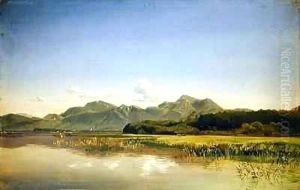Johann Beckmann Paintings
Johann Beckmann was a German scientific author and patron of the natural sciences, born on June 4, 1739, in Hoya in Lower Saxony, Germany. He is most renowned not for visual art, but for being a pioneer in the field of technology and for introducing the term 'technology' in its modern sense. Beckmann studied philosophy, theology, and natural sciences at the universities of Göttingen and Leipzig.
After his education, Beckmann embarked on extensive educational travels throughout Germany, the Netherlands, France, and Switzerland. These travels exposed him to a wide range of manufacturing processes and technological innovations of the time. In 1766, he became a professor of economics at the University of Göttingen, one of the first appointments of its kind. His contributions to the field of economics and the study of technology were significant, as he believed in the practical application of natural sciences and the importance of technical education.
Beckmann's work as an academic was dedicated to the systematic study of technology and the industrial arts, and he sought to catalog and describe all of the tools, machines, processes, and techniques used in the industries of his time. In 1777, he introduced the term 'Technologie' (technology) in his work 'Anleitung zur Technologie', which was an attempt to classify the entire spectrum of human artifice. This work laid the foundation for the modern discipline of technology studies.
He also contributed to the fields of statistics and agriculture. His 'Grundsätze der teutschen Landwirthschaft' (Principles of German Agriculture) was published in 1769 and was another important work in his career. Throughout his life, Beckmann published numerous books and articles, establishing himself as a leading figure in the promotion of industrial and scientific knowledge.
Johann Beckmann's influence extended beyond his writings; he helped to establish collections of models and tools that could be used for teaching in various fields of technology and crafts. He died on February 3, 1811, in Göttingen. While Beckmann may not be a traditional artist in the sense of a painter or sculptor, his contributions to the understanding and organization of the technologies of his time have had a lasting impact on the way we approach and categorize the technical arts and sciences.
